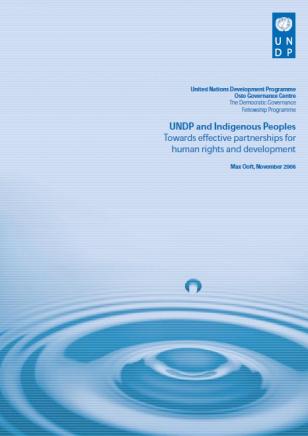UNDP and Indigenous Peoples towards Effective Partnerships

English
DownloadUNDP and Indigenous Peoples towards Effective Partnerships
August 12, 2013
Indigenous peoples’ rights have entered the mainstream human rights’ normative framework, as demonstrated by the recent adoption by the UN Human Rights Council of the Draft Declaration on the Rights of Indigenous Peoples, numerous national legislation products recognizing collective indigenous peoples’ rights, the increasing body of jurisdiction in national, regional and international human rights bodies and the adoption of specific policies and guidelines by development agencies and other organizations on the rights of indigenous peoples. However, indigenous peoples worldwide continue to be discriminated against, experience violation of their rights, are vastly overrepresented among the most vulnerable parts of society, are denied equal development opportunities and remain outside of mainstream development efforts and policy-making processes. In some cases, they continue to be adversely affected by development projects.
What has been the response of the UN’s Development Programme (UNDP) to those facts? Given the UN’s explicit mandate on human rights, equity and development: Has UNDP sufficiently engaged with indigenous and tribal peoples in promoting a rightsbased approach to development of those most in need of having a powerful partner? What are UNDP’s experiences in working with indigenous authorities/organizations or on indigenous issues?
These main questions are addressed in UNDP and Indigenous Peoples towards Effective Partnerships (2006) report.

 Locations
Locations




